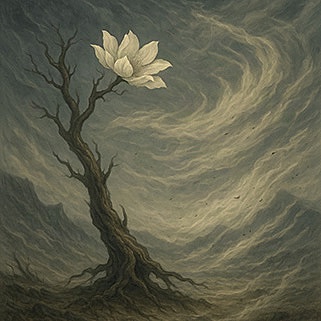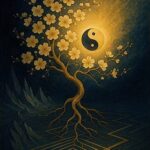Xieyi・The Rootless Tree:100 Verses-Verse 28#512

The poems of “The Rootless Tree” express a fundamental force rooted in harmony with heaven and earth, the cyclical flow of yin and yang, and the infinite potential of existence。
This painting is an expressive “Xieyi” in the tradition of “futu” (spiritual diagrams), passed down for generations in Wudang Mountain, China. It is drawn through a technique where energy flow (xingqi) channels the internal intention into visual form。 In the Taoist world, there exist spiritual and symbolic images called “futu”。
In the Taoist world, there exist spiritual and symbolic images called “futu”。
These are a type of talisman—not merely religious items, but expressive spiritual paintings that act directly on the mind of the viewer。
Since ancient times, many people have placed these Taoist-style “Xieyi” and futu in their homes, studies, or bedrooms, wishing for longevity, health, auspiciousness, and family harmony. Viewing such paintings was not just aesthetic appreciation, but an act of inviting the presence of the Dao into one’s life and tuning the body and mind。
Thus, “Xieyi” is more than artistic expression—it is a medium that bridges the spirit, life, and harmony with the universe。
This kind of artwork is not meant to be seen only with the eyes, but felt with the heart。
It communicates with the Dao, resonates with the qi of nature, and quietly stirs the viewer’s inner self。
Futu and “Xieyi” continue to live on from ancient times to this day as “sacred images that speak to the soul.”
Below, we present the original text of the philosophical poem “The Rootless Tree,” along with a modern Japanese translation and interpretation。
※ The author of “The Rootless Tree,” Zhang Sanfeng (1247–?), is also renowned as the founder of Tai Chi, and it is said that he applied the essence of this work to Tai Chi. As an additional note, we include an interpretation connecting this to the Tai Chi tradition of Wudang Mountain.
The Rootless Tree:100 Verses-Verse 28

Original Text
無根樹,花正荒,狂風吹過無影踪。心中無欲風不動,何人知其心已通。
Modern Translation
A wild blossom flares on a rootless tree;
Furious winds leave no trace behind.
When heart holds no desire, even wind stays still—Who would notice that this mind is already free?
Interpretation
1.[無根樹,花正荒] Untamed strength beyond convention.
2.[狂風吹過無影踪] All force passes without imprint.
3.[心中無欲風不動] Desireless mind moves not with storms.
4.[何人知其心已通] Mastery is silent; few can see it.
Interpretation related to Tai Chi
•Freedom arises after transcending forms.
•Highest hua-jin leaves no residue.
•Desirelessness breeds immovability.
•Realised adepts appear ordinary yet are fully integrated.
Copyright © MASAKI WAKABAYASHI. All rights reserved.




